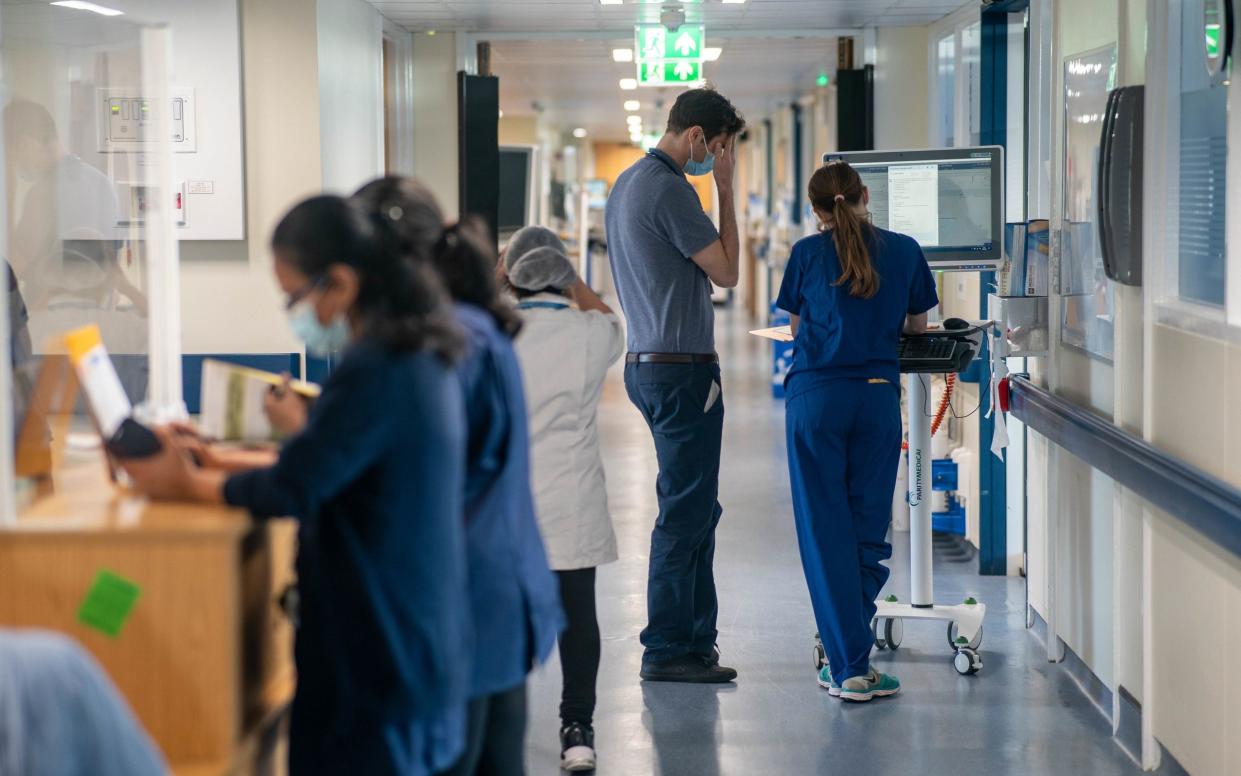It’s boom time for the lazy public sector – and we’ll all pay the price

The British labour market is once again cooling down, with unemployment and inactivity rising amid higher interest rates and electoral uncertainty. The hopes of a strong economic recovery after several miserable years have been dashed by an apparent return to stagnation.
But not everybody is feeling the pain. One part of our economy is booming. If they sold shares – and delivered a profit – financial advisors would recommend “Buy, Buy, Buy”. Who are these lucky few? Employees of the public sector, of course.
While unemployment ticked up by 138,000 over the three months to April, public sector employment reached the highest levels since 2012.
Civil servant numbers have risen to over 500,000, a figure not seen since before the financial crisis. And the NHS headcount now exceeds two million, a significant increase from the 1.5 million when the Conservatives came to power in 2010. Public sector wages grew by 6.4pc, outstripping the private sector growth of 5.8pc (the lowest since April 2022).
The state has expanded by squeezing the productive part of the economy with the highest tax burden since 1948. Britain’s corporation tax has been increased to 25pc, up from 19pc at the start of this parliament. The Institute for Fiscal Studies recently calculated that the Tories have introduced a dozen new taxes since 2010, making the tax code the longest it has ever been – which has “not resulted in a tax system that is fairer or more economically efficient.”
This bad situation is bound to get worse. No matter who wins next month, frozen income tax thresholds will increase the tax burden £20bn a year by 2028-9, even after accounting for planned cuts in National Insurance.
Labour intends to fund a raft of new commitments through VAT on private school fees, scrapping non-dom status, and extending the windfall tax on oil and gas.
However, this will only raise relatively minor amounts, especially after considering the second-order effects such moves will incur, such as pushing more students into state schools, the loss of high-net-worth individuals from the UK, and reduced investment in oil and gas. The Tories want to spend more on pensioners, childcare, healthcare, and defence.
Both parties have announced billions in new revenue from a crackdown on “tax cheats,” which means more money for HMRC enforcement officers. This has costs, too, as many innocent people will spend time, effort, and money defending themselves against invasive investigations.
The biggest red flag is the unspoken spending. Under the Government’s existing plans, public sector spending on justice, local government and further education will have to fall to ensure the NHS and pensions burden can keep growing. But Keir Starmer and Rachel Reeves have confidently declared that there will be “no return to austerity”. To avoid making real term cuts, they will have to raise an additional £20bn to £25bn.
We should, therefore, all be on standby for the post-election emergency budget to raise taxes and fill this shortfall. The Liberal Democrats announced a plan this week to increase capital gains contributions, and a particularly stupid tax on share buybacks which will only result in more debt financing and dividends. Notably, Labour has refused to rule out increases in capital gains tax, inheritance, or fuel duty.
The deeper frustration is that we’re not getting particularly good value for all this additional tax and spend. The NHS epitomises this problem. Not too long ago, it was common to hear the argument that Britain’s healthcare may not shine in performance outcomes, such as keeping people alive, but it did at least cost relatively less than other systems. That’s no longer true. We now pay among the most for healthcare yet continue to receive sub-par service.
The number of doctors, nurses, and other staff has shot up over 15pc since the pandemic, but the number of people getting treated in hospitals has only marginally increased.
Over 7.5 million people are still on waiting lists, and hundreds of thousands are waiting more than four hours to be seen in A&E. Obtaining a GP appointment is a labyrinthine quest against almost insurmountable odds. NHS poor performance has raised other costs, too, like the rising demand for disability benefits.
Britain risks getting stuck in a trap. An ageing population puts immense pressure on public services; a planning system prevents homes and infrastructure from being built, which, among countless other regulations, seriously hampers growth.
The Government’s approach to these challenges has largely been to give up. Rather than annoy anyone through painful reforms, the Government has adopted the frog-boiling method of letting the tax burden steadily tick up while throwing cash at failing public services.
Changing course requires an entirely new approach. School education is one of the few areas of success in recent years. England is now one of the highest-performing countries in the Western world in mathematics, reading, and science.
In spite of a significant decline in per-pupil funding over the past decade, outcomes improved thanks to clever Coalition government reforms that expanded school choice and competitive pressures. That contrasts with Scotland, where per pupil spending is much higher – yet outcomes are much worse. We must ditch our high-cost, low-outcome agenda once and for all.
Matthew Lesh is the Director of Public Policy and Communications at the Institute of Economic Affairs


